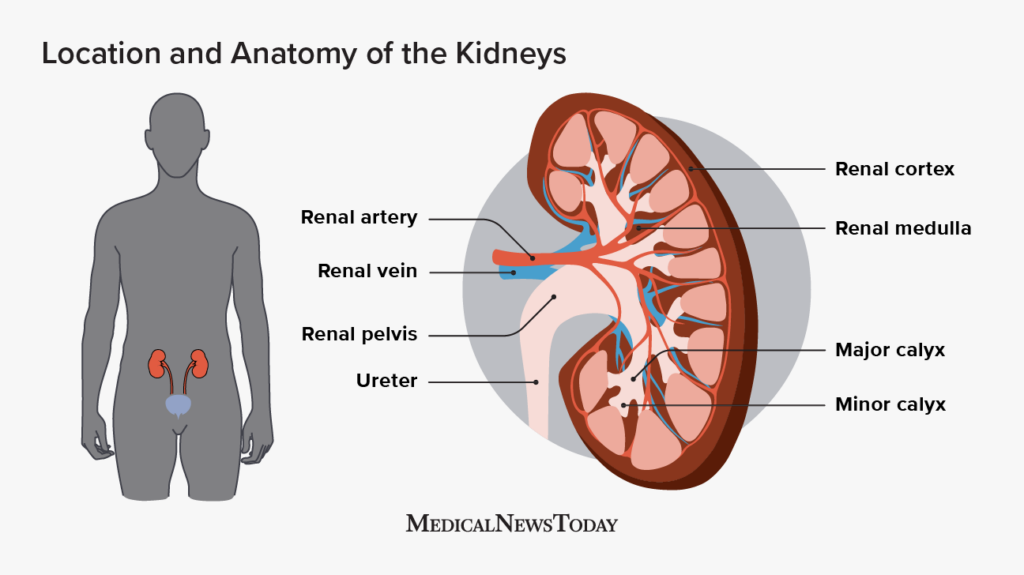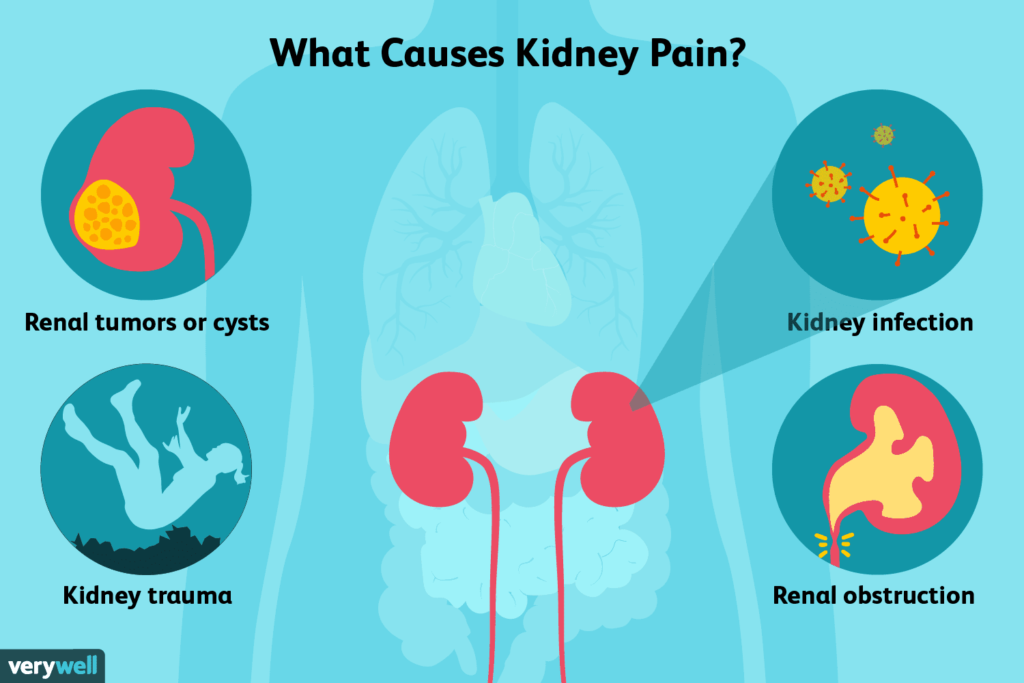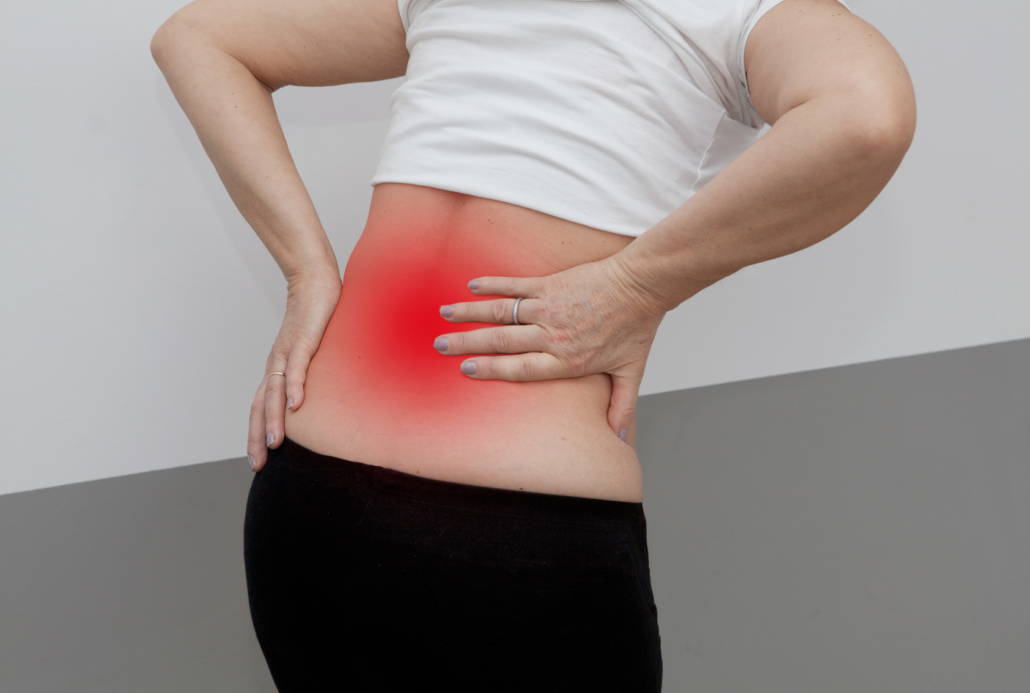Imagine waking up one morning with a persistent cough that seems innocent at first. As the day progresses, you notice a sharp, localized pain in your left flank every time you cough. Concerned and perplexed, you wonder why your kidney seems to be affected when you’re only experiencing a simple cough. This experience is not uncommon, and many individuals have faced similar situations, leading them to seek answers and solutions.
Living with unexplained pain in your left kidney when coughing can be unsettling, especially when it seems to occur in unexpected situations. It can leave you wondering about the cause, potential implications, and whether you should seek medical attention.
In this article, we will delve into the reasons why you might experience left kidney pain when coughing, providing insights into possible causes and helpful information to better understand your condition.
Essential Things You Need To Understand About Kidney Pain
Kidney pain, also known as renal pain, refers to discomfort or aching sensations in the area of the kidneys. Understanding the nature of kidney pain is crucial in identifying the underlying causes and seeking appropriate treatment. Here, we will delve deeper into the characteristics of kidney pain and distinguish it from other types of pain:
Definition and Characteristics of Kidney Pain
- Kidney pain is typically described as a dull, throbbing ache or a sharp, stabbing sensation in the back or the sides of the abdomen.
- The pain may radiate to the lower abdomen or groin area, and sometimes even into the thigh.
- It is often accompanied by other symptoms such as urinary changes (e.g., frequency, urgency), blood in the urine, fever, nausea, or vomiting.
- Unlike muscle or skeletal pain, kidney pain is not typically affected by movement or changes in body position.
Recommended: Can Kidney Stones Cause You To Lose Weight?
Differentiating Kidney Pain from Other Types of Pain
- Back pain: Kidney pain is often confused with back pain due to location. However, kidney pain is usually felt deeper and higher in the back, below the rib cage, while back pain tends to be more superficial and localized in the muscles or spinal structures.
- Abdominal pain: Although kidney pain can cause abdominal discomfort, it is important to differentiate it from pain originating from the gastrointestinal tract or other abdominal organs.
- Muscle pain: Unlike muscle pain, which is commonly associated with muscle strains or injuries, kidney pain is not directly related to physical activity or exercise.
- Nerve-related pain: Kidney pain is distinct from nerve-related pain conditions such as sciatica or neuropathy, which are characterized by shooting or burning sensations along specific nerve pathways.
Understanding the specific characteristics of kidney pain helps individuals identify when their left kidney hurts specifically when coughing, as cough-induced kidney pain may indicate certain underlying conditions. If left kidney pain persists or worsens, it is essential to consult a healthcare professional for further evaluation and diagnosis.
Recommended: Can Kidney Problems Cause Coughing?
Anatomy and Physiology of the Kidneys
To comprehend why the left kidney might hurt when coughing, it is important to have a basic understanding of the anatomy and physiology of the kidneys. The kidneys play a vital role in maintaining the body’s overall health and well-being:
Structure and Location of the Kidneys
- The kidneys are two bean-shaped organs situated on either side of the spine, just below the rib cage.
- They are retroperitoneal organs, meaning they are located behind the peritoneum, a membrane that lines the abdominal cavity.
- The left kidney is positioned slightly higher than the right kidney due to the presence of the liver on the right side.
- Each kidney is approximately the size of a fist and is composed of three main regions: the renal cortex, renal medulla, and renal pelvis.

The function of the Kidneys
The kidneys perform several critical functions, including:
- Filtration: The kidneys filter waste products, excess water, and toxins from the blood to produce urine.
- Fluid and Electrolyte Balance: They help regulate the body’s fluid levels, electrolyte concentrations, and acid-base balance.
- Blood Pressure Regulation: The kidneys play a crucial role in maintaining optimal blood pressure by regulating the balance of sodium, potassium, and water in the body.
- Red Blood Cell Production: They produce a hormone called erythropoietin, which stimulates the production of red blood cells in the bone marrow.
- Vitamin D Activation: The kidneys activate vitamin D, which is essential for calcium absorption and bone health.
Recommended: Can Your Kidneys Hurt From Coughing?
Connection Between the Kidneys, Urinary System, and Coughing Reflex
- The kidneys are interconnected with the urinary system, which includes the ureters, bladder, and urethra.
- The ureters carry urine from the kidneys to the bladder, where it is stored until it is expelled through the urethra.
- Coughing is a reflex action that involves a forceful expulsion of air from the lungs to clear the airways.
- The vigorous contraction of the diaphragm and abdominal muscles during coughing can exert pressure on the urinary system, including the kidneys.
- In some cases, the increased pressure caused by coughing can affect the kidneys or surrounding structures, resulting in pain or discomfort.
Possible Causes of Left Kidney Pain When Coughing

Left kidney pain during coughing can be attributed to various factors, including kidney-related causes and non-kidney causes. Understanding these potential causes is essential for identifying the underlying condition and seeking appropriate medical care. Let’s explore these causes in more detail:
Kidney-related Causes
1. Kidney Infections
- Kidney infections, also known as pyelonephritis, occur when bacteria enter the kidneys and cause an infection.
- Common symptoms include left-sided back pain, fever, chills, frequent urination, and a strong urge to urinate.
- Coughing can worsen kidney infection pain due to the increased pressure on the kidneys and surrounding tissues.
- Prompt treatment with antibiotics is necessary to prevent complications and relieve symptoms.
Recommended: Azo For Kidney Stones: Debunking Myths and Misconceptions
2. Kidney Stones
- Kidney stones are hard mineral and salt deposits that form in the kidneys. When they move or pass through the urinary tract, they can cause significant pain.
- Left kidney stones can lead to left-sided kidney pain, which may intensify when coughing due to increased pressure.
- Other symptoms include severe flank pain, blood in the urine, frequent urination, and nausea.
- Treatment options for kidney stones depend on the size and location of the stones and may range from conservative measures to surgical intervention.
Non-kidney Causes
1. Musculoskeletal Issues
- Musculoskeletal problems, such as muscle strains, sprains, or injuries in the lower back or abdominal area, can cause referred pain to the left kidney region.
- Coughing can exacerbate the pain by engaging the muscles and putting additional strain on the affected area.
- Conditions like muscle spasms, herniated discs, or vertebral misalignments may also contribute to left kidney pain during coughing.
- Proper diagnosis and treatment from a healthcare professional, such as physical therapy or pain management, can help alleviate the discomfort.
2. Abdominal Conditions
- Certain abdominal conditions can lead to left kidney pain when coughing due to their proximity to the kidneys or the referral of pain.
- Examples include hernias, ovarian cysts, or inflammatory bowel diseases, which can cause pain that radiates to the left kidney area.
- The increased intra-abdominal pressure during coughing can intensify the discomfort associated with these conditions.
- Treating the underlying abdominal condition often helps alleviate the referred kidney pain.
Identifying the specific cause of left kidney pain during coughing requires a comprehensive evaluation by a healthcare professional.
Recommended: Can You Poop Kidney Stones Out?
Seeking Medical Attention and Diagnosis
If you experience persistent left kidney pain when coughing, it is important to consult a healthcare professional for a thorough evaluation and proper diagnosis. Prompt medical attention is essential to identify the underlying cause and initiate appropriate treatment. Here are some important points regarding seeking medical attention and the diagnostic process:
1. Importance of Consulting a Healthcare Professional
- Persistent or worsening left kidney pain during coughing should not be ignored, as it may indicate an underlying condition that requires medical intervention.
- Consulting a healthcare professional, such as a primary care physician, urologist, or nephrologist, is crucial to assess your symptoms, perform a physical examination, and determine the necessary diagnostic tests.
2. Diagnostic Process
- Medical History: The healthcare professional will inquire about your medical history, including any previous kidney-related issues, urinary tract infections, kidney stones, or musculoskeletal problems.
- Physical Examination: A physical examination may involve palpation of the abdomen and back to assess for tenderness, checking for any swelling or masses, and evaluating your overall health.
- Imaging Tests: Diagnostic imaging, such as ultrasound, CT scan, or MRI, may be ordered to visualize the kidneys, urinary system, and surrounding structures. These tests help identify kidney stones, infections, or structural abnormalities.
- Blood and Urine Tests: Laboratory tests, including blood and urine analysis, can provide valuable information about kidney function, the presence of infection or inflammation, and the composition of kidney stones if present.
- Other Diagnostic Procedures: In some cases, additional procedures, such as cystoscopy (a procedure to visualize the bladder and urethra) or urodynamic studies (to evaluate urinary function), may be recommended to further investigate the underlying cause.
3. Collaborative Approach
- Your healthcare professional may work in collaboration with specialists, such as radiologists or urologists, to interpret test results and determine the most appropriate course of action.
- Openly communicate your symptoms, concerns, and any changes in your condition to ensure an accurate diagnosis and effective treatment plan.
Recommended: How Long Does Kidney Failure Take To Kill You?
Timely diagnosis is crucial to address the underlying cause of left kidney pain when coughing. With proper evaluation and diagnosis, the healthcare professional can develop an individualized treatment plan tailored to your specific needs, providing relief from discomfort and promoting overall kidney health.
Treatment Options and Self-Care Measures
The treatment for left kidney pain when coughing depends on the underlying cause identified through proper diagnosis. It is important to follow the recommended treatment plan prescribed by a healthcare professional.
Additionally, certain self-care measures can help alleviate symptoms and promote kidney health. Here are some common treatment options and self-care measures:
Kidney-Related Causes
1. Kidney Infections
- Antibiotics: If a kidney infection is diagnosed, the healthcare professional will prescribe a suitable course of antibiotics to eliminate the infection
- Pain Management: Over-the-counter pain relievers, such as nonsteroidal anti-inflammatory drugs (NSAIDs), may be recommended to manage pain and reduce inflammation.
- Hydration: Drinking plenty of water helps flush out bacteria and promotes kidney health. Adequate hydration is essential during and after a kidney infection.
2. Kidney Stones
- Conservative Treatment: Small kidney stones often pass on their own. The healthcare professional may recommend drinking ample fluids to encourage stone passage and may prescribe pain medication to manage symptoms.
- Medical Procedures: For larger stones or stones causing severe pain, medical interventions such as extracorporeal shock wave lithotripsy (ESWL), ureteroscopy, or surgical removal may be necessary.
- Dietary Modifications: To prevent stone formation, the healthcare professional may recommend dietary changes, such as reducing sodium and oxalate intake, and increasing fluid consumption.
Recommended: Does AZO Help With Kidney Stones?
Musculoskeletal Causes
- Physical Therapy: If musculoskeletal issues are causing left kidney pain during coughing, a physical therapist can provide exercises and stretches to strengthen the affected muscles, improve posture, and alleviate pain.
- Pain Management: Over-the-counter pain relievers, muscle relaxants, or topical analgesics may help manage pain associated with musculoskeletal problems.
- Heat or Cold Therapy: Applying heat or cold packs to the affected area can help relieve pain, reduce inflammation, and promote relaxation of the muscles.
Abdominal Causes
- Treating the Underlying Condition: For abdominal conditions causing referred kidney pain, such as hernias or ovarian cysts, the primary focus is on managing and treating the specific condition. This may involve surgery, medication, or other interventions as determined by the healthcare professional.
- Pain Management: Pain relievers recommended by the healthcare professional can help alleviate discomfort during coughing episodes.
Self-Care Measures for Kidney Health
- Hydration: Staying well-hydrated is crucial for maintaining kidney health and preventing urinary tract issues. Aim to drink an adequate amount of water throughout the day.
- Healthy Diet: Adopt a balanced diet rich in fruits, vegetables, whole grains, and lean proteins. Limit sodium, sugar, and processed food intake, as they can negatively impact kidney function.
- Regular Exercise: Engage in regular physical activity to promote overall health and circulation. Consult with a healthcare professional for suitable exercise recommendations.
- Smoking Cessation: Quit smoking, as it can impair kidney function and contribute to various kidney-related issues.
- Stress Management: Chronic stress can affect overall health, including kidney health. Practice stress-reducing techniques such as meditation, deep breathing exercises, or engaging in hobbies.
It is important to consult with a healthcare professional to determine the most appropriate treatment plan and self-care measures for your specific condition. Following medical advice, adopting healthy lifestyle practices, and adhering to prescribed treatments can help manage kidney pain, promote healing, and improve overall kidney health.
Recommended: How To Deal With Whooping Cough (Pertussis)
Prevention and Lifestyle Recommendations
Preventing kidney pain and maintaining optimal kidney health are crucial for overall well-being. By adopting certain lifestyle practices and making conscious choices, you can reduce the risk of kidney-related issues and minimize the occurrence of left kidney pain when coughing. Here are some preventive measures and lifestyle recommendations to consider:
Hydration
- Stay well-hydrated by drinking an adequate amount of water throughout the day. Sufficient hydration helps flush out toxins and prevents the formation of kidney stones.
- Aim to drink at least 8-10 glasses of water daily, or more if advised by your healthcare professional.
- Limit the consumption of sugary beverages, caffeine, and alcohol, as they can contribute to dehydration and potentially harm kidney function.
Healthy Diet
- Adopt a balanced diet that includes a variety of fruits, vegetables, whole grains, and lean proteins.
- Limit sodium intake, as excessive sodium can increase blood pressure and strain the kidneys. Choose low-sodium alternatives and avoid adding extra salt to your meals.
- Reduce the consumption of processed foods, which often contain high levels of sodium, preservatives, and additives that can negatively impact kidney health.
- Limit the intake of foods high in oxalate (such as spinach, rhubarb, and beets) if you are prone to kidney stone formation.
Regular Exercise
- Engage in regular physical activity to promote overall health and maintain a healthy weight.
- Regular exercise improves blood circulation and helps keep the kidneys functioning optimally.
- Consult with your healthcare professional to determine appropriate exercises based on your fitness level and any underlying health conditions.
Recommended: Understanding The Huge Benefits Of Exercise To Your Brain
Smoking Cessation
- Quit smoking and avoid exposure to secondhand smoke. Smoking damages blood vessels and reduces blood flow to the kidneys, increasing the risk of kidney disease.
- Seek support from healthcare professionals, support groups, or smoking cessation programs to help you quit smoking successfully.
Limit Medication Misuse
- Follow proper medication usage guidelines and consult with your healthcare professional before taking any over-the-counter medications or supplements that may affect kidney function.
- Avoid long-term and excessive use of medications that can potentially harm the kidneys, such as nonsteroidal anti-inflammatory drugs (NSAIDs) or certain antibiotics.
Manage Chronic Conditions
- If you have chronic conditions such as diabetes or high blood pressure, work closely with your healthcare professional to manage these conditions effectively.
- Follow the recommended treatment plan, take prescribed medications as directed, and attend regular check-ups to monitor kidney function.
Practice Good Hygiene
- Maintain good hygiene practices to prevent urinary tract infections (UTIs) that can lead to kidney infections.
- Properly clean the genital area, urinate before and after sexual activity, and stay hydrated to promote urinary tract health.
Regular Health Check-ups
- Schedule regular check-ups with your healthcare professional to monitor kidney function, blood pressure, and overall health.
- Routine screenings and tests can help detect any early signs of kidney problems and allow for timely intervention.
Recommended: How Remote Medicine Is Improving Healthcare Services
By incorporating these preventive measures and lifestyle recommendations into your daily routine, you can reduce the risk of kidney-related issues, enhance kidney health, and potentially minimize the occurrence of left kidney pain when coughing. Remember to consult with your healthcare professional for personalized advice and guidance based on your specific health needs.
Conclusion
Left kidney pain when coughing can have various causes, including kidney-related issues and non-kidney factors. Seeking medical attention and receiving a proper diagnosis is crucial for determining the underlying cause. Treatment options depend on the specific cause, ranging from antibiotics for kidney infections to pain management and medical procedures for kidney stones.
Self-care measures, such as hydration, a healthy diet, exercise, and quitting smoking, can contribute to kidney health. Preventive measures and lifestyle choices play a vital role in minimizing the risk of kidney-related problems. Prompt medical intervention, accurate diagnosis, and adherence to treatment plans are essential for managing left kidney pain and promoting overall kidney health. Consulting a healthcare professional is advised for personalized guidance.
